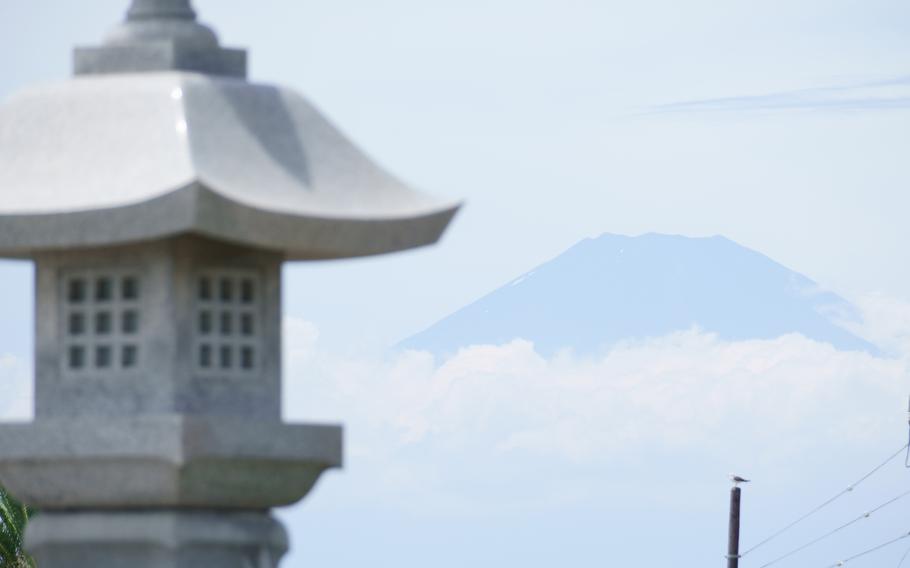
Mount Fuji's summit is seen from Enoshima Beach in Fujisawa city, Japan, Aug. 2, 2021. (Akifumi Ishikawa/Stars and Stripes)
TOKYO — Communities around Mount Fuji want the government to limit the number of people allowed to climb Japan’s highest peak this summer amid an expected surge in visitors due to relaxed COVID-19 restrictions.
A group of six cities, towns and villages surrounding the iconic mountain, along with local tourism bureaus, petitioned Yamanashi prefecture Gov. Kotaro Nagasaki on June 12, calling for measures to prepare for an “unprecedented” number of climbers, according to a news release on Fujiyoshida city’s website.
Yoshida Trail — the most popular hiking route on Mount Fuji — is on the Yamanashi prefecture side of the 12,388-foot-high active volcano.
"The number of climbers at Mount Fuji is expected to be unprecedented this summer based on the current status of reservations of mountain huts," the petition said.
The petition expressed concerns that increasing numbers of climbers, unable to reserve space in the huts, may hike straight to the summit without taking rests, increasing their risk of altitude sickness, hypothermia and falls.
The group is considering measures such as extending the period that first-aid stations are open and increasing patrols by emergency workers.
However, these moves may not be enough to respond to the number of climbers expected this summer, according to the petition.
"There is a need for fundamental measures, such as calculating the sufficient number of climbers and limiting the entry," it stated.
The petition also suggests temporarily limiting the number of climbers permitted on the mountain at night or during dangerous weather conditions.
Many visitors, including foreigners, are expected as Mount Fuji celebrates its 10th anniversary of being listed as a World Heritage site.
About 310,000 climbers visited the mountain in 2013 when it was registered as a World Heritage site, according to Environment Agency data.
Around 250,000 climbers ascended Mount Fuji every year before the COVID-19 outbreak. It was closed in 2020; around 78,500 climbers hiked the mountain in 2021 and about 160,100 in 2022, according to the Ministry of the Environment.
A Fujiyoshida city official urged visitors to come prepared to avoid injuries and sickness.
"There are people every year who come unprepared, who are injured or get hypothermia, especially foreigners," she said by phone Wednesday.
Some Japanese officials are required to speak to the media only on the condition of anonymity.
She warned that the weather may change drastically on the mountain and that temperatures drop suddenly at night.
She also recommended visitors bring rain gear. Winds sometimes blow rain up the mountain rather than down, meaning waterproof pants are essential to preventing climbers from getting hypothermia, she said.
Trails up the mountain will open July 1 on the Yamanashi side and July 10 in Shizuoka prefecture and will remain open until Sept. 10 in both prefectures, according to Mount Fuji’s official website.